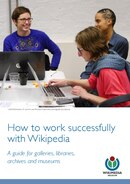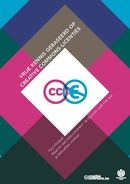GLAM

GLAM is an acronym for "galleries, libraries, archives, and museums". Often GLAMs collect cultural heritage materials. The Wikimedia movement works together with GLAMs, all for a common goal: making digital collections accessible to the widest possible audience.
GLAM also includes erfgoedcellen, heemkundige kringen which are closely related to heritage.
Why collaborating with Wikipedia and Wikimedia?
[edit]
Wikipedia is consulted millions of times a day, consisting of more than 300 languages and has more than 36 million articles. The online encyclopedia Wikipedia is in the top 10 most visited websites worldwide. Wikimedia Commons contains more than 80 million media files that are being reused on Wikipedia and on the other Wikimedia platforms and thereby seen every day by millions of people. All media files on Wikimedia Commons can be also be used on third-party MediaWiki platforms. The GLAM-Wiki initiative provides knowledge and heritage institutions a unique opportunity to share their collections through the various MediaWiki platforms with this global audience. The advantages:
- Page views: heritage collections that are shared through Commons, can be reused in the online encyclopedia Wikipedia. Wikipedia editors are always looking for high-quality media files (images as well as audio-visual) to enrich articles and thus more and more files find their way into articles in one of the more than 270 language versions of Wikipedia, where they are seen daily by millions of people.
- World wide audience: Wikipedia is used by people from around the world. It offers GLAM institutions access to an audience that they cannot reach through their own portal, or even through national heritage portals.
- Co-creation: anyone can edit Wikipedia and the other Wikimedia platforms. This means that knowledge and heritage institutions can rely on the global knowledge of the 'crowd' to complement and enhance the meta data descriptions of their digital heritage collections.
Common collaboration models
[edit]- Workshop Wikipedia for your organisation staff: in an afternoon or a morning, the staff of your organisation meets experienced Wikipedia editors to learn more about how Wikipedia works, its philosophy and how you can use Wikipedia/Wikimedia for getting more attention for your organisation. This activity is commonly preceded by a short introduction about editing Wikipedia, time for asking questions and followed by bringing the learned into practise by starting writing on Wikipedia.
- Workshop Wikipedia open to the public at your organisation: starting in the morning, people interested in your organisation can participate in a Wikipedia workshop where they write about topics from your collection. This activity is commonly preceded by a short introduction about editing Wikipedia, its philosophy and basic principles, and followed by editing in Wikipedia under the guidance of experienced Wikipedia editors. These workshops are often called edit-a-thons.
- Content donation: with a content donation (a part of) a digital or digitalised collection is made available under an open (Creative Commons) license through Wikimedia Commons, the media library of Wikipedia and all Wikimedia projects. Wikimedia Commons often serves as a free back-up of the digitalised collection of an organisation and can contain images, audiovisual materials and texts. These files can be re-used in Wikipedia and beyond, with respect for the licensing terms. Your collection becomes more relevant for society and you will have more visitors to your website. For uploading and following the usage of the files, we have handy tools available.
- Metadata donation: with a donation of meta data you share the data of (a part of) your collection under the CC0 on Wikidata, the database of Wikipedia and all Wikimedia projects. The data in Wikidata can be used by your organisation, and also by other institutions in Belgium, and can give your database more context and relevance. In 2015 a whitepaper has been written about the usage of Wikidata and Linked Open Data, and contains a briefly introduction in the Wikimedia movement and the projects Wikipedia and Wikidata, a description of the business cases to document artworks in Wikidata, specifically for museums, and a crosswalk, explaining how collection data is mapped to the data model of Wikidata. Read the whitepaper at: Flemish art collections, Wikidata and Linked Open Data.
- Wikipedian-in-Residence: is a Wikimedia specialist who is temporary “embedded” in your institution and organizes activities during that period around the various Wikimedia platforms. These activities may include all of the above, but also training for the staff of your organisation. He or she also acts as an intermediary between the Wikimedia community and the employees of your organisation. Ideally, your organisation is able to engage independently with the Wikimedia community after the departure of the Wikipedian-in-Residence. Funding for Wikipedian-in-Residence is usually applied on a project basis with external funds. More info at Wikimedian in residence.
- GLAM-Wiki coordinator: is someone in an organisation who takes up the role of coordinator between the internal organisation and the Wikimedia community. Various cultural institutions have made the interaction with Wikimedia an integral part of their policy, and structurally freed time for collaboration. A GLAM-Wiki coordinator is part of the institution and arranges images and other media to be released under an open license and organises activities to enlarge the usage of the released materials and having the public have more attention for the collection.
More possibilities
[edit]To give organisations a better understanding of how Wikipedia works and how they can collaborate with us, we have published two brochures with more information and specific examples of the many organisations that successfully collaborate(d) with Wikipedia.
How to work successfully with Wikipedia
[edit] Download in English |
 Download in French |
 Download in Dutch |
Free Knowledge thanks to Creative Commons Licenses
[edit] Download in English |
 Download in French |
 Download in Dutch |
Contact
[edit]Contact us for more information at glam![]() wikimedia.be.
wikimedia.be.
Documentation
[edit]News
[edit]News about GLAM collaborations is published in the:
